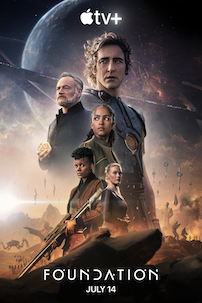Based on the short stories of Isaac Asimov, psycho-history and the thousand-year saga of The Foundation, rebels who discover that the only way to save the Galactic Empire from destruction is to defy it, continues splendidly unabated into its second 10 part season.
The confusion of season one and its many-pronged genesis tales lay the foundation to a much clearer season two with its focus on separate but interlinked narratives that are concurrent and decades apart.
In essence set 100 years after the end of season one, many of the characters remain – the world-building of Foundation and the technological chicanery facilitates such quantum leaps of faith. Pyscho historian and mathematician Hari Seldon (Jared Harris) with his algorithmic science that allows him to predict the future in terms of probabilities is the gel, remaining central to all plots and subplots. Hari’s prodigy Gaal (Lou Llobell) finds herself with daughter Salvor (Leah Harvey), who is the same age, on the planet Ignis. A copy of Hari Seldon’s consciousness within the Prime Radiant is in Gaal’s possession – and it’s hot property.
Meanwhile, Emperor Brother Day (Lee Pace) struts his royal stuff looking to protect the Empire and create his own lineage by marrying feisty Queen Sareth of Cloud Dominion (Ella-Rae Smith) whilst on the planet Terminus, Hari has been deified and two of his followers – Poly Verisof (Kulvinder Ghir) and Brother Constant (Isabella Laughland) – find themselves drawn into the conspiracy against the empire.
Foundation is a whipsmart, classy sci-fi extravaganza of worlds regarded at one time as unfilmable. Requiring personal investment, as an epic saga it continuously captivates as it navigates new territory and develops new or returning characters with the revelations of Demerzel (Laura Birn), the wholly loyal robot and, so it turns out, sexual partner of Brother Day a memorable plotline. Greater clarity in its storylines (and less of them) ensures that whilst there are a few caveats, season two outsmarts and outdoes season one.
Rating: 68%


